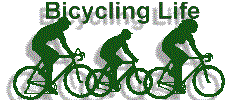After a warm dry winter, we had finally entering the snowy season in Denver when I
attended a regular meeting of Aurora's paths-n-paint committee to uphold the cause of
vehicular cycling.
With 5-6 inches of fresh wet stuff on the roads by the time of my ride home after the
meeting at 9:30pm, there wasn't much traffic, and I got to make "First Tracks"
in several areas. It was a beautiful ride, about 25F with snow still falling, quiet and
peaceful. I didn't want to go inside when I got home, but my battery duration limited my
enjoyment.
As I anticipated, I was the only person who rode to the meeting. The rest drove
(individually) in their cars and SUVs. They congratulated each other on their dedication
to "The Cause", as evidenced by getting out on "such an awful night."
Their comments upon my arrival (covered with snow, dripping on the carpet, and grinning)
were fascinating. They expressed admiration that I would attempt such a feat as to ride in
these conditions, and between them enumerated all the fears they could imagine to keep
them from riding: visibility, cars sliding into them, etc.
But since I'm the only person I've ever seen riding to any of these meetings, I get the
feeling that unless it's recreation they look for excuses not to ride, rather than
deciding that they're going to use a bicycle for transportation and creatively finding
ways to make it work. This is consistent with their paths-n-paint agenda: if there's no
segregated facility to take them to their destination, it's not reachable by bicycle, so
they drive a car and complain about how hard it is to get around on a bike.
The guest this month was a City Council member who was introduced as "an avid
trail user and a friend of cycling". As we discussed ways for cyclists to take a more
active role in city government, all their brainstorming focused on the committees in
charge of open spaces, parks and recreation, and the like. I was the one who pointed out
that cyclists should have input to the transportation planning process, and I suspect my
comments were only given credence because I tied acceptance to the public's currently
fashionable sensitivity to sprawl, congestion, pollution, etc., and the state's stated
policy of openness to "alternative transportation".
I don't know whether a claim to "same roads, same rules, same rights" would
have worked with this crowd. So far as I have been able to discern, multi-use recreational
paths in this area are considered transportation projects, funded with transportation
money, but built in parks and recreational spaces to "Parks and Rec"
specifications. I'm trying to elbow my way into the local transportation planning arena so
that I can advocate road surface maintenance, wide curb lanes instead of wide sidewalks,
etc.
The most productive part of the evening (from my point of view) came when our
Councilmember listened attentively to my recounting the story of a traffic light with a
loop detector that is insensitive to bicycles, and the unsatisfactory responses from the
city's Traffic Engineer and City Attorney (it's not city policy to detect bicycles at
traffic lights). She understood the problem, and promised to research it and get back to
me. I believe she will, and I'm looking forward to seeing what comes of it.
